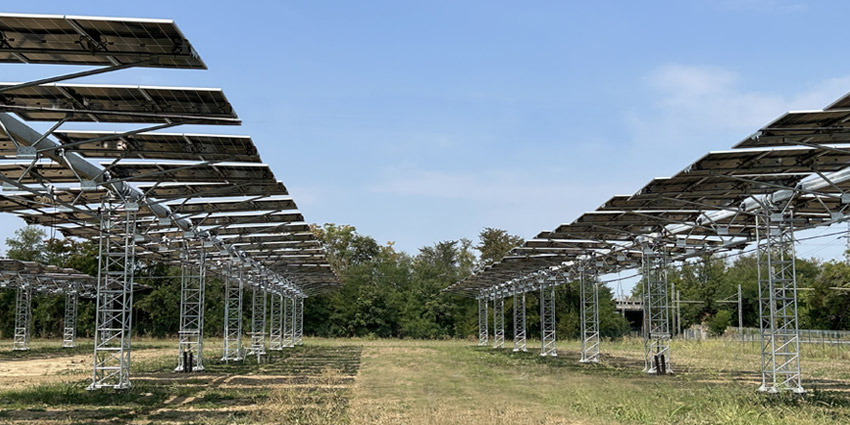- Follow
An innovative project, in collaboration with the University of Piacenza, to support the sustainability of the tomato supply chain

Rivarolo del Re (CR), [30 September 2024] - Casalasco S.p.A., Italy's first integrated supply chain for industrial tomatoes, has launched an experimental project for the creation of the first agrivoltaic park for growing tomatoes, in collaboration with the Faculty of Agriculture of the Università Cattolica del Sacro Cuore of Piacenza. This project, conceived by Casalasco, is an important initiative to promote sustainability and improve energy efficiency throughout the production chain.
The plant, which involved an investment of approximately 2 million euros, is part of a broader plan of interventions planned in the Group's various plants to support the environment and is worth a total of 24.5 million euros. It will cover an area of about 2 hectares in an industrial area, near the Casalasco plant in Fontanellato. The photovoltaic panels will be placed on metal structures about 5 metres high, allowing the regular performance of the underlying agricultural activities. Thanks to a software, developed in collaboration with the Catholic University of Piacenza, which will constantly collect and analyse incoming data, the panels will be able to orient themselves to maximise the absorption of solar energy and ensure the right amount of light for the crops.
The agrivoltaic park will have an annual production capacity of about 1600 MWh which, together with the energy produced by the cogeneration plant installed in 2023 within the same site in Fontanellato, will be sufficient to cover over 90% of the plant's energy needs. This project represents a step towards energy self-sufficiency and the reduction of Casalasco's environmental impact, which through the agrivoltaic park will reduce CO2 emissions by 680 tonnes per year.
The energy produced by the agrivoltaic park will also be used to power the new Innovation Centre of Casalasco, a project of the Group currently under construction, also in Fontanellato, in a building adjacent to the office building.
The initiative is not limited to energy benefits, but aims to offer a replicable model for all member farms. The experimentation on growing tomatoes under solar panels will, in fact, make it possible to identify the most suitable varieties for this type of cultivation and optimise the balance between shade and light, thus improving the quality and yield of the produce.
The partnership with the Università Cattolica del Sacro Cuore of Piacenza, recognised among the excellences in the field of agricultural sciences, gives the project a solid scientific and innovative foundation. The interaction between academic research and industry underlines Casalasco's commitment to promoting sustainable and technologically advanced agriculture.
The construction of the agrivoltaic park will take about a year. Upon completion of the work, Casalasco will proceed with the evaluation of the results obtained to consider the possible application of the technology to wider extensions.
"The agrivoltaic park represents a further important step towards a more sustainable, integrated and innovative agriculture," said Costantino Vaia, CEO of the Casalasco Group. The combination of cultivation and photovoltaic systems offers new opportunities not only to improve energy efficiency and reduce environmental impact, but also to maximise production results. We are sure that this experimental project can provide significant benefits for Casalasco, but certainly also for the entire tomato supply chain that we represent, promoting a more balanced and sustainable development of the sector."
Casalasco has chosen to install an advanced agrivoltaic system that guarantees maximum flexibility in both the management of the plant and agricultural crops, said Stefano Amaducci, Professor of Agronomy and Herbaceous Crops at the Department of Sustainable Plant Production at the Università Cattolica del Sacro Cuore in Piacenza and the project coordinator. Using the IT platform and monitoring systems developed over years of research at the Università Cattolica, we will be able to optimise the agrivoltaic system so that it is an effective tool to support the energy transition and decarbonisation of the industrial tomato supply chain while at the same time preserving the yield and quality of the agricultural product.